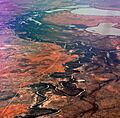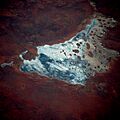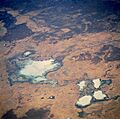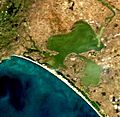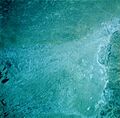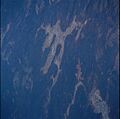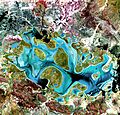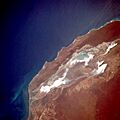List of lakes of Australia facts for kids
Australia doesn't have many natural freshwater lakes like some other countries. This is because Australia hasn't had much ice or big earth movements that usually create lakes.
Contents
Types of Lakes
Most lakes in Australia fit into one of five main groups. We're not talking about lakes made by people, like dams for water storage. These are natural lakes:
- Coastal Lakes and Lagoons: These are lakes found along the coast, sometimes connected to the ocean. Some are "perched lakes," which means they sit high up on sand dunes, filled only by rainwater.
- Natural Freshwater Inland Lakes: These lakes are found away from the coast. They often dry up and fill again, so they are called "ephemeral" (temporary). Many are part of wetlands or swampy areas.
- Glacial Lakes: These lakes were carved out by ancient glaciers (huge sheets of ice). On mainland Australia, there are only five of these, all in the Snowy Mountains. But in Tasmania, because of a lot of past ice activity, there are many natural freshwater lakes, especially on the central plateau. Some of these have been made bigger for hydro-electric power.
- Salt Lakes: Most of Australia's lakes are actually dry, salt lakes. They are found in the flat desert areas where there aren't many rivers to carry water away to the sea.
- Volcanic Lakes: These are lakes that formed in the craters of old volcanoes.
Lakes by State and Territory
Let's explore some of the interesting lakes you can find across Australia!
Australian Antarctic Territory
Australia claims a part of Antarctica called the Australian Antarctic Territory. Here, you'll find lakes that were formed by glaciers. They are very cold!
- Braunsteffer Lake
- Dingle Lake (about 68 hectares)
- Krok Lake
- Lake Zvezda
Australian Capital Territory
The Australian Capital Territory doesn't have any big natural lakes. Most of its well-known lakes were built by people, like Lake Burley Griffin in Canberra.
New South Wales
New South Wales has a mix of lake types, from coastal lagoons to icy glacial lakes in the mountains.
- Lake Albina: A small glacial lake in the Snowy Mountains. It's part of the Kosciuszko National Park.
- Avoca Lake: A coastal lake on the Central Coast.
- Blue Lake: Another glacial lake in the Snowy Mountains, known for its beautiful blue water. It's also a special Ramsar site for wetlands.
- Lake George: A large, temporary freshwater lake in the Southern Tablelands. It often dries up completely.
- Lake Illawarra: A large coastal lake in the Illawarra region.
- Lake Macquarie: The largest coastal saltwater lake in the Southern Hemisphere! It's found in the Hunter area.
- Menindee Lakes: A group of temporary freshwater lakes in the far west, important for water storage.
- Lake Mungo: A famous dry salt lake in the far west. It's important for its ancient history and Aboriginal heritage.
- Myall Lakes: A beautiful group of coastal lakes on the Mid North Coast.
Northern Territory
The Northern Territory is home to some very large, often dry, salt lakes in its desert regions.
- Lake Amadeus: A huge salt lake in the southwest, covering over 100,000 hectares!
- Lake Mackay: An even bigger salt lake, shared with Western Australia. It's one of the largest in Australia.
- Numby Numby: This isn't a typical lake, but a sinkhole filled with water, found in the Gulf of Carpentaria region.
- Tarrabool Lake: A large, temporary freshwater lake on the Barkly Tableland. It's an important area for birds.
Queensland
Queensland has a variety of lakes, including volcanic lakes and many coastal lakes.
- Lake Barrine: A beautiful volcanic lake in Far North, part of the Atherton Tableland.
- Blue Lake: A coastal lake on North Stradbroke Island in South East.
- Lake Boomanjin: A "perched lake" on Fraser Island, meaning it's filled only by rainwater and sits high on sand.
- Lake Buchanan: A large salt lake in North.
- Lake Cootharaba: A coastal lake in the Wide-Bay region, part of the Great Sandy National Park.
- Lake Eacham: Another stunning volcanic lake in Far North Queensland.
- Lake McKenzie: A very famous "perched lake" on Fraser Island, known for its incredibly clear blue water and white sand.
- Lake Wabby: Also on Fraser Island, this is a unique green lake that is slowly being swallowed by a moving sand dune.
South Australia
South Australia is famous for its massive salt lakes, some of which are among the largest in the world.
- Lake Albert and Lake Alexandrina: These are large freshwater lakes near the mouth of the Murray River. They are very important wetlands.
- Blue Lake: A volcanic lake in the Limestone Coast region. Its water changes color dramatically with the seasons!
- Lake Bumbunga: A salt lake in the Mid North region, sometimes appearing pink due to algae.
- Kati Thanda–Lake Eyre: This is Australia's largest lake and the lowest point on the continent. It's a huge salt lake that only fills completely a few times a century, turning into a massive inland sea.
- Lake Frome: Another very large, dry salt lake in the Flinders Ranges.
- Lake Gairdner: A stunning salt lake on the Eyre Peninsula, known for its bright white surface.
- Coongie Lakes: A group of important wetlands in the Far North, a designated Ramsar site.
- Lake Torrens: A large, temporary salt lake in the Flinders Ranges.
Tasmania
Tasmania has many natural freshwater lakes, especially in its central highlands, thanks to past glaciers.
- Dove Lake: A beautiful freshwater lake at the foot of Cradle Mountain, part of the Cradle Mountain-Lake St Clair National Park.
- Great Lake: One of Tasmania's largest freshwater lakes, located in the Central Highlands.
- Lake St Clair: Australia's deepest freshwater lake, also part of the Cradle Mountain-Lake St Clair National Park. It's the end point of the famous Overland Track.
- Orielton Lagoon: A coastal lagoon in the South East Coast, important for birds.
Victoria
Victoria has a mix of coastal and inland lakes, including some significant salt lakes.
- Lake Corangamite: A large salt lake in Victoria.
- Gippsland Lakes: A huge network of coastal lakes and lagoons in eastern Victoria, popular for boating and fishing.
- Lake Hindmarsh: A large, temporary freshwater lake in the Wimmera region.
- Lake Victoria: A coastal lake.
- Pink Lake (Victoria): A salt lake in the Wimmera region, known for its pink color.
- Lake Tali Karng: A freshwater lake located in the Alpine region, known for its remote and beautiful setting.
Western Australia
Western Australia has many large salt lakes in its vast desert areas, as well as important freshwater wetlands near Perth.
- Lake Ballard: A salt lake in the Goldfields-Esperance region, famous for its unique art installations.
- Lake Barlee: A very large salt lake in the Mid West.
- Bibra Lake: A freshwater lake in Perth, part of the Beeliar Regional Park.
- Lake Carnegie: A massive temporary lake in the Goldfields-Esperance region.
- Dumbleyung Lake: A salt lake in the Great Southern region.
- Forrestdale Lake: A brackish (slightly salty) seasonal lake in Perth, an important nature reserve.
- Lake Gregory: A large seasonal freshwater lake in the Kimberley region.
- Herdsman Lake: A freshwater lake in Perth, a regional park and important wetland.
- Lake Hillier: A truly amazing salt lake on Middle Island, famous for its bright pink color!
- Hutt Lagoon: Another vibrant pink salt lake in the Mid West, used for growing algae that produces a special color.
- Lake Joondalup: A freshwater lake in Perth, part of the Yellagonga Regional Park.
- Kumpupintil Lake: A very large, dry salt lake in the Pilbara region.
- Lake Mackay: A huge salt lake shared with the Northern Territory.
- Lake Macleod: A large freshwater lake in the Gascoyne region.
- Lake Monger: A freshwater lake in Perth, a popular spot for recreation.
- Pink Lake: Another salt lake in the Goldfields-Esperance region that can turn pink.
- Toolibin Lake: A unique "perched" freshwater lake in the Wheatbelt, an important Ramsar site.
Images for kids
See also
- List of reservoirs and dams in Australia
- List of lagoons of Australia











